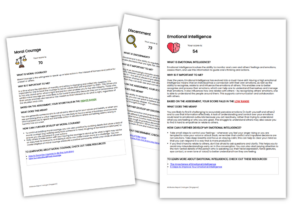Culture assessment
Culture assessments are used to gage the standard behaviors that define a business and its environment. These assessments can be used to analyze the existing culture as well as what the team – and company – want it to become.
Use a culture assessment to:
- Gain a better understanding of the current behaviors, values, beliefs and assumptions that compose your company culture
- Learn more about what is important to your team, departments or entire company in terms of culture. Understand areas where they would like to see improvement
- Receive immediate, easily digestible feedback on your company’s culture with a branded, personalized PDF report






What is a culture assessment?
Company culture defines your business. It includes the values, beliefs, missions, goals, attitudes and assumptions of your team as a whole. Each business has its own personality – fun, serious, ambitious, laid back, etc. It is what attracts and retains talent in competitive industries. That’s why it’s so important to make sure your company culture reflects what you and your team want from the business. A culture that fits your company will lead it to long-term success, but one that doesn’t fit your business’s personality and values will lower moral and motivation.
Popular examples of these assessments include the Business Needs Scorecard (BNS); Job Satisfaction Survey and a Common Good, Transformation, Self-Interest Diagram (CTS).
- The BNS is a six-part scorecard that maps positive and possibly limiting values of an organization to assess the current and desired culture values from the position of leadership. These main categories include finance, fitness, external relations, evolution, culture and contribution to society.
- The Job Satisfaction Survey provides an opportunity for feedback from employees on their perceived organizational culture and the values they do and don’t support.
- A CTS Diagram presents an outlet for employees to explain what they think of the cultural values in your business and where they think leadership should focus its attention.
Company culture is something that evolves frequently as your team expands and changes. These assessments provide opportunities for you to better understand your current culture and how to adapt it to best benefit you, your team and your business overall.
Understanding your culture
Each business has its own culture based on its values, beliefs and goals. There aren’t necessarily “right” or “wrong” cultures – it mainly depends on what is important to the company. Below are the types of cultures:
- Innovative culture – These businesses focus less on hierarchy and more on experimentation and innovation.
- Aggressive culture – These businesses are extremely competitive. Outperforming their competitors is more important than corporate social responsibilities.
- Result-oriented culture – The main focuses in these businesses are action, figures and numbers. Employees and managers are held accountable for the success of the business.
- Stable culture – Bureaucracy is at the heart of these businesses. They are predictable by nature, and neither quick action and dynamic changes are not frequent.
- Employee-oriented culture – Fairness and respect for individuals are at the core of these businesses. Management takes extra care to make these employees feel heard and valued.
In order to build onto your culture, you first need to understand the culture type you currently have.
Why use Pointerpro as a culture assessment tool?
Why use Pointerpro as a culture assessment tool?
Personalized reports
Help your team better understand both the goals and what’s important in terms of company culture with our comprehensive PDF reports at the end of the questionnaire that can contain individual as well as team, department or company data.
White label your culture assessment
These questionnaires are focused specifically on your business, so make them truly your own with our white label option. Remove the Pointerpro branding on your questionnaire so you can use your own logos, brand colors, unique URL, branded reports and more.
Adventurous assessment components
The crème de la crème of a personalized experience… Create it with assessment-features such as Variable Scores per answer, personalized Outcomes, and an Animated Gauge to indicate results. Our Formulas feature, which allows you to do calculations within the questionnaire to get even more insightful feedback.
Culture assessment example questions
- What grade would you assign to our current company culture?
- On a scale of 1 to 10 (1 being not at all and 10 being definitely), how motivational do you find our company culture?
- In what ways do you think our company culture is supportive?
- In what areas would you like to see improvement with our culture?
- On a scale of 1 to 10, how would you rate the collaboration at our company?
Tips to create a great culture assessment
- Your employees are busy! You don’t want to take too much time away from their projects and tasks, so make sure to keep the questions simple and straight-forward.
- Vary the question format with multiple choice, scales and open-ended questions to keep your employees engaged throughout the assessment.
- Make sure your quiz reflects your company culture, whether it be fun and playful or more serious and straight to the point.
Here's what our customers say
Recommended reading

Boost audience engagement with hot take questions
We’ve all seen them – those social media posts that make you stop scrolling and

How youth development specialist Halogen reaches thousands of young Singaporeans with Pointerpro [case study]
Singapore, in Southeast Asia, is a global, economic powerhouse with a population of a little

Accountancy marketing: 3 ways to make the numbers human again [case study]
Like so many aspects of business, accountancy practices have made their ascent into the cloud.
Create your first culture assessment today.


